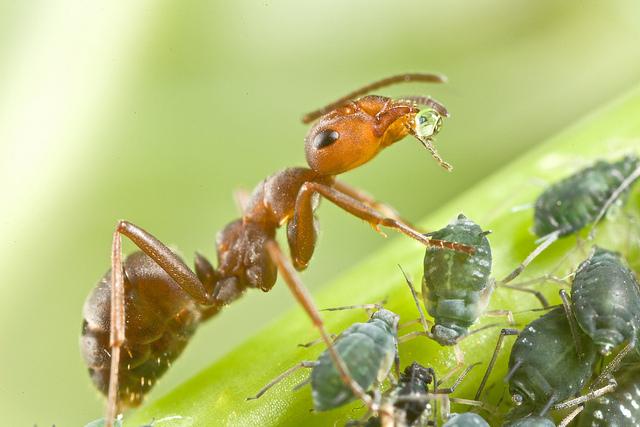I recently read The Leader in Me which is basically the application of Covey's 7 Habits to elementary schools. Rather than giving specifics of how to implement the principles, the book tells a few stories of how Leadership principles successfully transformed schools. This leaves open a lot freedom for figuring out how. While there are plenty of examples given for English and History, Science seems like a bit more of a challenge so here are some ideas I've come up with.
 |
Mutualism Teaches Habit 4: Think Win-Win.
Ants and aphids both benefit from their interaction. |
For a Life Science class specifically, in the Ecology unit there is a classic breakdown of feeding relationships in living organisms which is a great opportunity to talk about win/win. Feeding relationships in living organisms are traditionally divided into the categories of commensalism, mutualism, predation and parasitism. Of these mutualism is basically the same idea as habit 4 think win-win and the other categories can also serve to show contrasting examples. Some other examples of organisms with a mutualistic or symbiotic, win-win type relationship are bacteria in the human gut, Ostriches and gazelles feeding together, Oxpecker with Rhinoceros, wrasse fish with black sea bass, yucca plant with yucca moth, Clown fish with Sea anemone and many many more including other pollinators. What I really like about learning the ecology relationships along with habit 4 win-win is that as students deepen their understanding mutualistic relationships they can also deepen their understanding of win-win in their personal life thus reinforcing both.

In the introduction to the 7 Habits Covey explains the power of a habit in our personal lives. One of the best places ways to illustrate the power of habit in Newtons first law of inertia. Covey uses the example of a rocket taking off overcoming the pull of gravity to show the principle but any application of the law of inertia can really illustrate the same idea. Good habits gain their own inertia once that have overcome the static friction of gravity while bad habits tend to resist change. Another similar example is a car cranking to start the most challenging parts are the first few rotations.
 |
As static friction opposes the movement of an object
so new habits are hard to get started
|
The book also helped me realize I don't need to re-invent the fundamentals of character/moral/ethical ideas for students in my class but openly talk about the 7 habits principles and encourage students to find examples in their own lives and in the subjects we study.
Although I felt empowered to
use the 7 habit language more freely in my classroom the book also reminded me that real change in a school needs to involve administration. On that note, it is unfortunate that the Covey organization demands so much money for their training which also highlights for me how some of their corporate tendencies are not always totally compatible with academic pursuits. I think for most schools a compromise of either training and reading the book and figuring out how to apply the principles themselves works well enough although it would be nice to see more involvement from the Covey Organization directly in university teacher training. With direct teacher training new teachers wouldn't have as much disconnect between what they've already learned and something as effective as the 7 Habits.
Necessary sequences and order and the cell cycle, developmental stages, stages of a virus.



